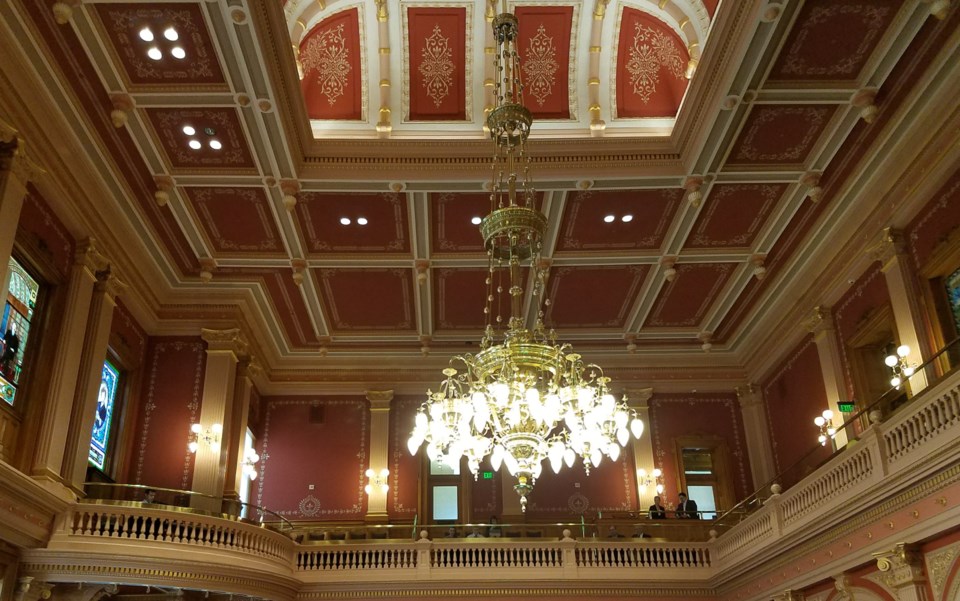On March 14, the Colorado State Legislature took the unprecedented but necessary step of shutting itself down in response to the COVID-19 pandemic. The conventional wisdom during the hiatus was that when it reconvened it would limit itself to the budget, and necessary responses to the pandemic for public health and the economic recovery.
The Legislature resumed meetings on May 26, the day after Memorial Day. That day will forever be remembered as the day George Floyd was killed by one police officer with a knee on his neck, two more holding him down, and a fourth fending off bystanders. It changed everything.
Quick work
On June 3, Democratic Sens. Leroy Garcia and Rhonda Fields and Democratic Reps. Leslie Fields and Serena Gonzales-Gutierrez introduced Senate Bill 20-217 Enhance Law Enforcement Integrity. By June 4 the bill had a Fiscal Notecalling for $1.4 million in appropriations for FY 2020-21.
Main provisions of the bill include:
- Mandates that local public safety departments issue body-worn cameras to all peace officers and that they be activated whenever the officer is interacting with the public.
- Mandates all state and local agencies employing peace officers to report a defined set of incidents to the attorney general, who shall create and publish an annual report on the disclosures:
- All use of force by its officers that results in death or serious bodily injury;
- All instances when an officer resigned while under investigation for violating department policy;
- All data relating to stops conducted by its peace officers; and
- All data related to the use of an unannounced entry by a peace officer.
- Defines restrictions on an officer’s right to use deadly force, including repeal of the right to use any chokehold. (The city of Longmont’s use of force policy has heretofore been unable to prohibit chokeholds because the right was explicitly granted by the state.)
- Makes guarantees for civilians to bring civil suit when they believe their Constitutional rights have been violated by a peace officer.
Analysis
This writer predicts that SB20-217 will pass with amendments. With public opinion overwhelmingly favoring police reform, legislators risk little by voting to pass. The bill is strongly endorsed and promoted by the American Civil Liberties Union of Colorado. The Colorado Fraternal Order of Police has issued a long statement, calling for deferring consideration of the bill to 2021, or, failing that, significantly amending it. So far, even they have not called for its outright defeat.
Our concern is that this bill paints all police departments with a very broad brush. Some cities, Longmont among them, have worked long and hard for social justice in policing, and have achieved significant gains. If it “ain’t broke,” should we fix it? Community policing works.
On the converse, SB20-217 may set public expectations too high. Transparency and accountability can only do so much to change the character and culture of a group. It will take years, with the best will in the world, to change a police culture like we’ve seen in Buffalo to something like what we have achieved here in Longmont.
Fiscal rescue?
According to Representative Sonya Jaquez Lewis, D-District 12, members of the Legislature were “embargoed” from discussing other measures to be taken up after Memorial Day before the session resumed, even though work had continued during the stay-at-home period. So the big post-pandemic recovery measure was a surprise to many: a bipartisan measure to refer repealing the Gallagher Amendment to this fall’s ballot. (The primary Republican sponsor, Sen. Jack Tate, will not be seeking re-election this fall.)
A little background: Colorado passed the Gallagher amendment in 1982, which soaring property values burdened Colorado’s homeowners with onerous property taxes. The idea of Gallagher was to keep the tax burden equitable between commercial properties and residential properties, so that businesses would pay their fair share. Gallagher mandates that of the total state property tax revenues, at most 45% comes from residential properties. Commercial properties are taxed at a rate of 29% of assessed value, and the residential rate floats to preserve the 55:45 ratio. It’s one of those things that seemed like a good idea at the time.
But now Colorado’s exploding population, the ‘90s and ‘00s trend for enormous homes, and unintended interactions with TABOR have turned Gallagher into a boondoggle for wealthy homeowners and an albatross for schools and other state expenses traditionally funded by property taxes.
Repealing Gallagher would allow the state to protect its General Fund revenues from a crash in property values or closure of businesses. It could help struggling businesses by taxing them at a lower rate. And it could open a new revenue source that would be progressive in effect by increasing residential tax rates. At present, Colorado’s residential property tax rates are among the lowest in the nation.
The people’s choice
We won’t know Gallagher’s fate until November, since a vote of the people is required to repeal a Constitutional amendment. This must be a case of the people stepping forward for the common good. I asked Rep. Jonathan Singer, D-Disrtrict 11, how he will put voting for a Gallagher repeal to the people. He said, “If we don’t come up with a fix, kiss your fire district, your library district, any other special districts… goodbye. Maybe we will lose entire school districts if we don’t fix Gallagher. That is not an exaggeration.
In liberal Boulder County, liberals are having mixed feelings about this choice. A lot of them have expensive houses. As Rep. Singer says, it’s time for the people to step up.



